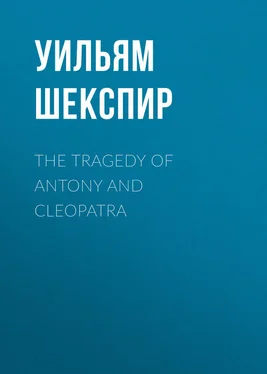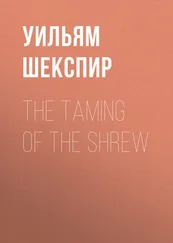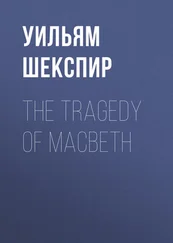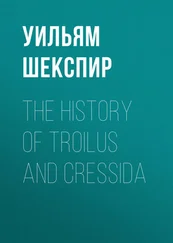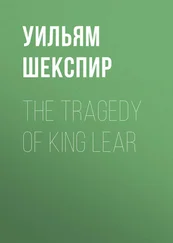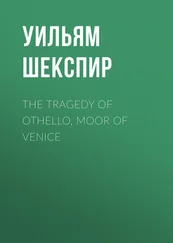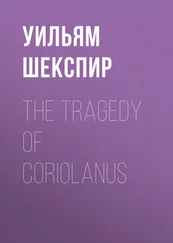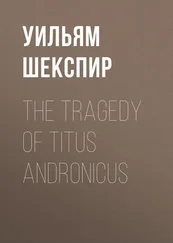Уильям Шекспир - The Tragedy of Antony and Cleopatra
Здесь есть возможность читать онлайн «Уильям Шекспир - The Tragedy of Antony and Cleopatra» — ознакомительный отрывок электронной книги совершенно бесплатно, а после прочтения отрывка купить полную версию. В некоторых случаях можно слушать аудио, скачать через торрент в формате fb2 и присутствует краткое содержание. Жанр: Европейская старинная литература, Драматургия, foreign_dramaturgy, на английском языке. Описание произведения, (предисловие) а так же отзывы посетителей доступны на портале библиотеки ЛибКат.
- Название:The Tragedy of Antony and Cleopatra
- Автор:
- Жанр:
- Год:неизвестен
- ISBN:нет данных
- Рейтинг книги:3 / 5. Голосов: 1
-
Избранное:Добавить в избранное
- Отзывы:
-
Ваша оценка:
- 60
- 1
- 2
- 3
- 4
- 5
The Tragedy of Antony and Cleopatra: краткое содержание, описание и аннотация
Предлагаем к чтению аннотацию, описание, краткое содержание или предисловие (зависит от того, что написал сам автор книги «The Tragedy of Antony and Cleopatra»). Если вы не нашли необходимую информацию о книге — напишите в комментариях, мы постараемся отыскать её.
The Tragedy of Antony and Cleopatra — читать онлайн ознакомительный отрывок
Ниже представлен текст книги, разбитый по страницам. Система сохранения места последней прочитанной страницы, позволяет с удобством читать онлайн бесплатно книгу «The Tragedy of Antony and Cleopatra», без необходимости каждый раз заново искать на чём Вы остановились. Поставьте закладку, и сможете в любой момент перейти на страницу, на которой закончили чтение.
Интервал:
Закладка:
SCENE IV. Rome. CAESAR'S house
Enter OCTAVIUS CAESAR, reading a letter; LEPIDUS, and their train
CAESAR. You may see, Lepidus, and henceforth know,
It is not Caesar's natural vice to hate
Our great competitor. From Alexandria
This is the news: he fishes, drinks, and wastes
The lamps of night in revel; is not more manlike
Than Cleopatra, nor the queen of Ptolemy
More womanly than he; hardly gave audience, or
Vouchsaf'd to think he had partners. You shall find there
A man who is the abstract of all faults
That all men follow.
LEPIDUS. I must not think there are
Evils enow to darken all his goodness.
His faults, in him, seem as the spots of heaven,
More fiery by night's blackness; hereditary
Rather than purchas'd; what he cannot change
Than what he chooses.
CAESAR. You are too indulgent. Let's grant it is not
Amiss to tumble on the bed of Ptolemy,
To give a kingdom for a mirth, to sit
And keep the turn of tippling with a slave,
To reel the streets at noon, and stand the buffet
With knaves that smell of sweat. Say this becomes him-
As his composure must be rare indeed
Whom these things cannot blemish- yet must Antony
No way excuse his foils when we do bear
So great weight in his lightness. If he fill'd
His vacancy with his voluptuousness,
Full surfeits and the dryness of his bones
Call on him for't! But to confound such time
That drums him from his sport and speaks as loud
As his own state and ours- 'tis to be chid
As we rate boys who, being mature in knowledge,
Pawn their experience to their present pleasure,
And so rebel to judgment.
Enter a MESSENGER
LEPIDUS. Here's more news.
MESSENGER. Thy biddings have been done; and every hour,
Most noble Caesar, shalt thou have report
How 'tis abroad. Pompey is strong at sea,
And it appears he is belov'd of those
That only have fear'd Caesar. To the ports
The discontents repair, and men's reports
Give him much wrong'd.
CAESAR. I should have known no less.
It hath been taught us from the primal state
That he which is was wish'd until he were;
And the ebb'd man, ne'er lov'd till ne'er worth love,
Comes dear'd by being lack'd. This common body,
Like to a vagabond flag upon the stream,
Goes to and back, lackeying the varying tide,
To rot itself with motion.
MESSENGER. Caesar, I bring thee word
Menecrates and Menas, famous pirates,
Make the sea serve them, which they ear and wound
With keels of every kind. Many hot inroads
They make in Italy; the borders maritime
Lack blood to think on't, and flush youth revolt.
No vessel can peep forth but 'tis as soon
Taken as seen; for Pompey's name strikes more
Than could his war resisted.
CAESAR. Antony,
Leave thy lascivious wassails. When thou once
Was beaten from Modena, where thou slew'st
Hirtius and Pansa, consuls, at thy heel
Did famine follow; whom thou fought'st against,
Though daintily brought up, with patience more
Than savages could suffer. Thou didst drink
The stale of horses and the gilded puddle
Which beasts would cough at. Thy palate then did deign
The roughest berry on the rudest hedge;
Yea, like the stag when snow the pasture sheets,
The barks of trees thou brows'd. On the Alps
It is reported thou didst eat strange flesh,
Which some did die to look on. And all this-
It wounds thine honour that I speak it now-
Was borne so like a soldier that thy cheek
So much as lank'd not.
LEPIDUS. 'Tis pity of him.
CAESAR. Let his shames quickly
Drive him to Rome. 'Tis time we twain
Did show ourselves i' th' field; and to that end
Assemble we immediate council. Pompey
Thrives in our idleness.
LEPIDUS. To-morrow, Caesar,
I shall be furnish'd to inform you rightly
Both what by sea and land I can be able
To front this present time.
CAESAR. Till which encounter
It is my business too. Farewell.
LEPIDUS. Farewell, my lord. What you shall know meantime
Of stirs abroad, I shall beseech you, sir,
To let me be partaker.
CAESAR. Doubt not, sir;
I knew it for my bond. Exeunt
SCENE V. Alexandria. CLEOPATRA'S palace
Enter CLEOPATRA, CHARMIAN, IRAS, and MARDIAN
CLEOPATRA. Charmian!
CHARMIAN. Madam?
CLEOPATRA. Ha, ha!
Give me to drink mandragora.
CHARMIAN. Why, madam?
CLEOPATRA. That I might sleep out this great gap of time
My Antony is away.
CHARMIAN. You think of him too much.
CLEOPATRA. O, 'tis treason!
CHARMIAN. Madam, I trust, not so.
CLEOPATRA. Thou, eunuch Mardian!
MARDIAN. What's your Highness' pleasure?
CLEOPATRA. Not now to hear thee sing; I take no pleasure
In aught an eunuch has. 'Tis well for thee
That, being unseminar'd, thy freer thoughts
May not fly forth of Egypt. Hast thou affections?
MARDIAN. Yes, gracious madam.
CLEOPATRA. Indeed?
MARDIAN. Not in deed, madam; for I can do nothing
But what indeed is honest to be done.
Yet have I fierce affections, and think
What Venus did with Mars.
CLEOPATRA. O Charmian,
Where think'st thou he is now? Stands he or sits he?
Or does he walk? or is he on his horse?
O happy horse, to bear the weight of Antony!
Do bravely, horse; for wot'st thou whom thou mov'st?
The demi-Atlas of this earth, the arm
And burgonet of men. He's speaking now,
Or murmuring 'Where's my serpent of old Nile?'
For so he calls me. Now I feed myself
With most delicious poison. Think on me,
That am with Phoebus' amorous pinches black,
And wrinkled deep in time? Broad-fronted Caesar,
When thou wast here above the ground, I was
A morsel for a monarch; and great Pompey
Would stand and make his eyes grow in my brow;
There would he anchor his aspect and die
With looking on his life.
Enter ALEXAS
ALEXAS. Sovereign of Egypt, hail!
CLEOPATRA. How much unlike art thou Mark Antony!
Yet, coming from him, that great med'cine hath
With his tinct gilded thee.
How goes it with my brave Mark Antony?
ALEXAS. Last thing he did, dear Queen,
He kiss'd- the last of many doubled kisses-
This orient pearl. His speech sticks in my heart.
CLEOPATRA. Mine ear must pluck it thence.
ALEXAS. 'Good friend,' quoth he
'Say the firm Roman to great Egypt sends
This treasure of an oyster; at whose foot,
To mend the petty present, I will piece
Her opulent throne with kingdoms. All the East,
Say thou, shall call her mistress.' So he nodded,
And soberly did mount an arm-gaunt steed,
Who neigh'd so high that what I would have spoke
Was beastly dumb'd by him.
CLEOPATRA. What, was he sad or merry?
ALEXAS. Like to the time o' th' year between the extremes
Of hot and cold; he was nor sad nor merry.
CLEOPATRA. O well-divided disposition! Note him,
Note him, good Charmian; 'tis the man; but note him!
He was not sad, for he would shine on those
That make their looks by his; he was not merry,
Which seem'd to tell them his remembrance lay
In Egypt with his joy; but between both.
O heavenly mingle! Be'st thou sad or merry,
The violence of either thee becomes,
So does it no man else. Met'st thou my posts?
ALEXAS. Ay, madam, twenty several messengers.
Why do you send so thick?
CLEOPATRA. Who's born that day
When I forget to send to Antony
Shall die a beggar. Ink and paper, Charmian.
Welcome, my good Alexas. Did I, Charmian,
Ever love Caesar so?
CHARMIAN. O that brave Caesar!
CLEOPATRA. Be chok'd with such another emphasis!
Say 'the brave Antony.'
CHARMIAN. The valiant Caesar!
CLEOPATRA. By Isis, I will give thee bloody teeth
If thou with Caesar paragon again
My man of men.
CHARMIAN. By your most gracious pardon,
I sing but after you.
CLEOPATRA. My salad days,
When I was green in judgment, cold in blood,
To say as I said then. But come, away!
Get me ink and paper.
He shall have every day a several greeting,
Or I'll unpeople Egypt. Exeunt
Интервал:
Закладка:
Похожие книги на «The Tragedy of Antony and Cleopatra»
Представляем Вашему вниманию похожие книги на «The Tragedy of Antony and Cleopatra» списком для выбора. Мы отобрали схожую по названию и смыслу литературу в надежде предоставить читателям больше вариантов отыскать новые, интересные, ещё непрочитанные произведения.
Обсуждение, отзывы о книге «The Tragedy of Antony and Cleopatra» и просто собственные мнения читателей. Оставьте ваши комментарии, напишите, что Вы думаете о произведении, его смысле или главных героях. Укажите что конкретно понравилось, а что нет, и почему Вы так считаете.
